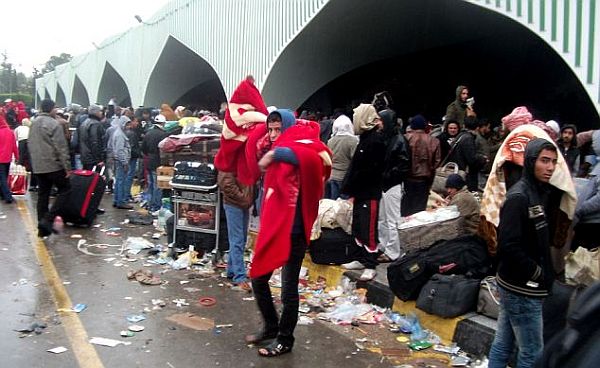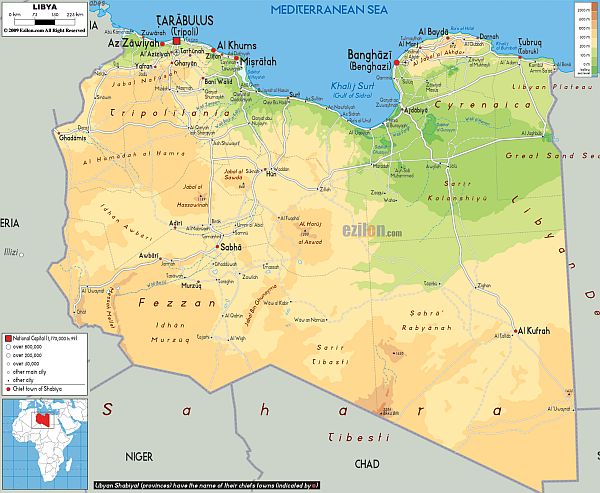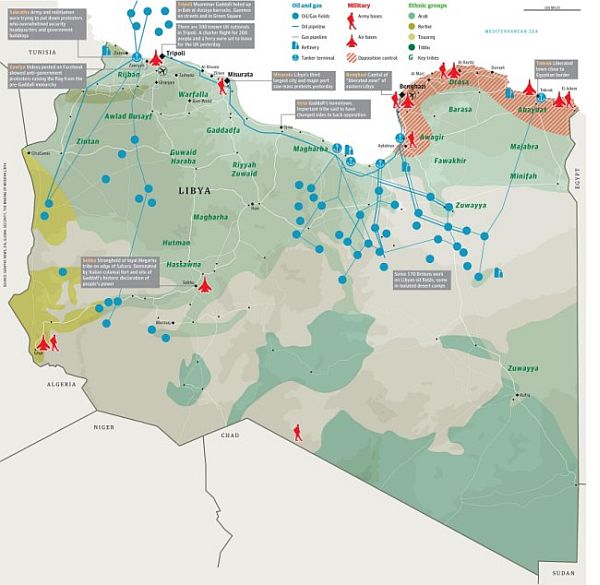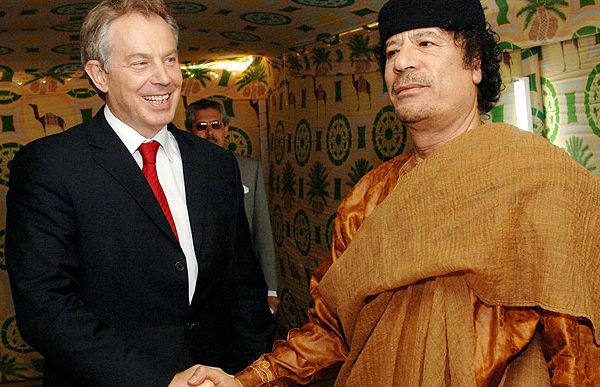The New York Times reports from Zawiya:
In this city 30 miles west of Tripoli, hundreds of people rejoiced in a central square on Sunday, waving the red, black and green flag that has come to signify a free Libya and shouting the chants that foretold the downfall of governments in Tunisia and Egypt: “The people want to bring down the regime.”
Rebels, in control of the city, had reinforced its boundaries with informal barricades, and military units that had defected stood guard with rifles, six tanks and anti-aircraft guns mounted on the backs of trucks. In the central square here, a mosque was riddled with enormous holes, evidence of the government’s failed attempt to take back this city on Thursday. Nearby lay seven freshly dug graves belonging to protesters who had fallen in that siege, witnesses said.
“We are really suffering for 42 years, and people are asking here for the same things as other people of the world — they want the real democracy,” said Ahmed El-Hadi Remeh, an engineer standing in the square. He and other residents told how they had used stones to repel the government’s forces.
Proving how close opposition control has come to the capital, where Col. Muammar el-Qaddafi maintains tight control, the confidence of the demonstrators in Zawiya was remarkable, all the more so because it was witnessed as part of the official tour for international journalists that Colonel Qaddafi’s government organized. The public relations effort, apparently intended to show a stable Libya to the outside world, appeared to backfire, as a tour of Tripoli had on Saturday.
Instead, the tour, whose minders were forced to wait at the city’s outskirts, showed a nation where the uprising had reached the capital’s doorstep, underscoring a growing impression that the ring of rebel control around Tripoli was tightening. But in a sign that the fight was far from over, armed government forces were seen massing around the city.
The Associated Press reports:
Two prominent U.S. Senators said Washington should recognize and arm a provisional government in rebel-held areas of eastern Libya and impose a no-fly zone over the area — enforced by U.S. warplanes — to stop attacks by the regime. U.S. Secretary of State Hillary Rodham Clinton echoed President Barack Obama’s demand for Gadhafi to relinquish power.
“We want him to leave,” she told reporters traveling with her Sunday to a U.N. meeting on Libya planned for Monday. “We want him to end his regime and call off the mercenaries and forces loyal to him. How he manages that is up to him.”
Gadhafi’s son, Seif al-Islam, claimed again that the country was calm and denied the regime used force or airstrikes against its own people. But human rights groups and European officials have put the death toll since unrest began in Libya nearly two weeks ago at hundreds, or perhaps thousands, though it has been virtually impossible to verify the numbers.
The U.N. Security Council moved as a powerful bloc Saturday to try to halt Libyan leader Moammar Gadhafi’s deadly crackdown on protesters, slapping sanctions on him, his children and top associates.
Voting 15-0 after daylong discussions interrupted with breaks to consult with capitals back home, the council imposed an arms embargo and urged U.N. member countries to freeze the assets of Gadhafi, four of his sons and a daughter. The council also backed a travel ban on the Gadhafi family and close associates, including leaders of the revolutionary committees accused of much of the violence against opponents.
Council members additionally agreed to refer the Gadhafi regime’s deadly crackdown on people protesting his rule to a permanent war crimes tribunal for an investigation of possible crimes against humanity.
Carne Ross, a former British diplomat at the UN, comments:
[T]here are some strking things about this resolution:
- Clear and early referral to the ICC (paras 4-8), including a demand that the ICC prosecutor brief the Council in two months’ time: this is remarkable. This is I think (and Barbara Plett thinks too) the first time the Council has voted unanimously for ICC referral. This resolution has also taken place very early in a conflict, only days after it began. In other words, the Council is moving in welcome fashion towards the preventive signalling required under the Responsibility to Protect doctrine (see my blog comment below). It is reacting almost as fast as news breaks of killing.
- The second remarkable thing is that the Libya situation is clearly internal. The Council may have denoted it as a “threat to international peace and security” in the preambular paragraphs (though I think this reference has been watered down in negotiation) and by putting the res under Chapter VII of the Charter, but to any outside observer it’s pretty clear that the conflict is confined within Libya’s borders, so far. There is a clear and unambiguous reference to Responsibility to Protect in the preambular paras. This is in my memory the first time that the Council has acted so quickly and so decisively on an internal situation. I am very surprised that the Chinese, Indians etc went along with such clear language. International public opinion seems to be moving them. This is an important precedent too.
- Thirdly, on a more political note, this resolution is putting the Libyan regime in the freezer – big time. The assets freeze, travel ban etc apply to named members of the regime. These measures will be legally obligatory for all member states to impose – the resolution is under Chapter VII of the charter. And the measures will be in place indefinitely. These sanctions are not time-limited and will require a further positive vote of the Council to be lifted. In other words, all P5 will have to agree, plus 9 non-permanents. Moreover, the criteria for sanctions lift are left very unclear. What this means in practice is the total international isolation of members of the Gadhaffi regime indefinitely.
Reuters reports:
Britain said on Sunday it had revoked Muammar Gaddafi’s diplomatic immunity, putting pressure on the Libyan leader to step down after his government’s bloody crackdown on a revolt against his rule.
Officials said the move, which backs up U.N. Security Council sanctions agreed on Saturday, was an unprecedented step by Britain against a serving head of state.
“It is time for Colonel Gaddafi to go,” Foreign Secretary William Hague told the BBC, in the strongest language Britain’s nine-month-old coalition has used so far about the crisis.
The diplomatic immunity of Gaddafi’s sons, family and household had also been revoked, Hague said.
Hague said Gaddafi appeared to have stocks of mustard gas, a potentially deadly chemical weapon, that had not been destroyed under a 2003 agreement to dismantle weapons of mass destruction (WMD).
“Some of those stocks do appear to exist although we are not sure what condition they are in,” Hague said.
Separately, Peter Mandelson, a close confidant of former British Prime Minister Tony Blair, said that Blair had been in contact with Gaddafi in the last few days.
The Independent adds:
According to Whitehall sources, Mr Blair made an initial call to the Libyan President, who has ordered helicopter gunships to fire on protesters he described as “rats” and “cockroaches”. The Middle East envoy urged him to cease the attacks. The sources suggested that, after consultations with the British Foreign Office, Mr Blair was told that the UK Government would prefer the Libyan President to step down, and so he agreed to phone him again and transmit that message. There was no comment from Mr Blair’s office yesterday. Government sources could not say last night whether ministers knew in advance about the initial phone call.
The first oblique hint that Mr Blair might be in active contact with the Libyan regime came in a routine briefing on Friday in which US State Department spokesman P J Crowley said the former PM was among the international figures that Secretary of State Hillary Clinton had spoken to during the day. Asked why Mrs Clinton called Mr Blair and if it was because of “his dealings with Gaddafi over the Lockerbie bomber”, the spokesman said of Mr Blair: “He has very important and valuable contacts inside of Libya.”
The Daily Telegraph reports:
Mercenaries captured in Libya are facing an uncertain future, writes Nick Meo in Al-Bayda.
Crowded into an empty classroom which was stinking of unwashed bodies and reeking of fear, Colonel Muammar Gaddafi’s defeated mercenary killers awaited their fate.
A week earlier the men – Libyan loyalists of the dictator and black African recruits – had been landed at airports throughout eastern Libya and sent out into the streets to shoot protesters in a murderous rampage. They killed dozens before they were overwhelmed by anti-Gaddafi militias.
The survivors were exhausted, filthy, far from home, and fearful of execution, even though they had been assured of good treatment. Fifty of them lay on mattresses on the floor in one classroom alone, with nearly 100 more in the same school building which was being used as a temporary prison. Most looked dazed. Some were virtually children.
“A man at the bus station in Sabha offered me a job and said I would get a free flight to Tripoli,” said Mohammed, a boy of about 16 who said he had arrived looking for work in the southern Libyan town only two weeks ago from Chad, where he had earned a living as a shepherd.




